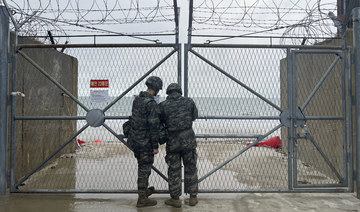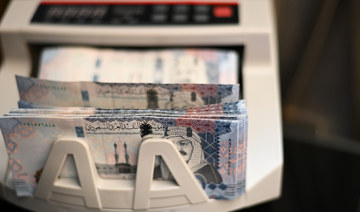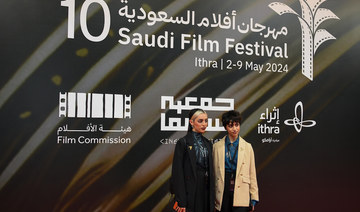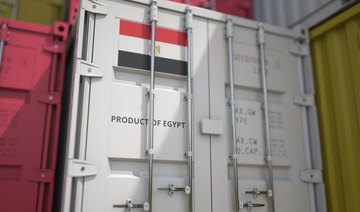UNITED NATIONS: South Korea called on the divided UN Security Council on Thursday “to break the silence” over North Korea’s escalating missile tests and threats.
“It’s a big question,” South Korea’s UN Ambassador Hwang Joonkook told reporters after an emergency closed meeting of the council on the North’s first ballistic missile test of 2024 on Sunday. South Korea is serving a two-year term on the council.
The Security Council imposed sanctions after North Korea’s first nuclear test explosion in 2006 and tightened them over the years in a total of 10 resolutions seeking — so far unsuccessfully — to cut funds and curb its nuclear and ballistic missile programs.
The last sanctions resolution was adopted by the council in 2017. China and Russia vetoed a US-sponsored resolution in May 2022 that would have imposed new sanctions over a spate of intercontinental ballistic missile launches. Since then, the two veto-wielding permanent council members have blocked any council action, including media statements.
North Korea’s escalating test-launches in violation of the existing UN sanctions — five ICBMs, more than 25 ballistic missiles and three satellite launches using ballistic missile technology in 2023 – coupled with new threats from the North’s leader Kim Jong Un have raised regional tensions to their highest point in years.
On Monday, Kim declared North Korea would abandon its commitment to a peaceful unification with South Korea and ordered a rewriting of its constitution to eliminate the idea of a shared statehood between the war-divided countries. He said South Koreans were “top-class stooges” of America who were obsessed with confrontation, and repeated a threat that the North would annihilate the South with its nukes if provoked.
Before Thursday’s council meeting, US Deputy Ambassador Robert Wood told reporters Kim’s provocations “are of great concern.”
He said the 15 council members need to be reminded that North Korea is violating sanctions and its obligations to the council, “and we have to insist that they adhere to those obligations, and for all Security Council members to enforce those resolutions.”
By contrast, China’s UN Ambassador Zhang Jun, whose country is a close ally of North Korea, called on all parties involved in the Korean Peninsula to stay calm and refrain from actions that would further raise tensions.
In a message clearly aimed at the United States and South Korea, Zhang expressed hope that while attention is mainly on North Korea, “other countries are also responsible to avoid further escalation.”
France’s UN Ambassador Nicolas De Riviere told reporters that North Korea’s actions are “getting worse and worse,” with regular ballistic missile launches, continuing uranium enrichment, and advancement of its nuclear program.
“Everyone is focused on missile launches, but I think the biggest threat is their nuclear program which continues to grow again and again,” De Riviere said.
And he called it “a shame” that Russia is violating Security Council resolutions by “buying military stuff that they use in Ukraine” from North Korea. “It’s really bad,” he said.
South Korea’s Hwang said all 15 members of the Council are worried that North Korea’s rhetoric and actions are “getting more and more serious.”
But how to break the council’s silence and inaction?
“We will discuss and think about it, and how to move forward,” he said. “It’s a big question.”
As for Kim’s abandonment of peaceful reunification, Hwang called it “a big change” in their rhetoric, actions and policy. “The nuclear policy is highly, highly alarming,” he said.
South Korea calls on divided UN council ‘to break the silence’ on North Korea’s tests and threats
https://arab.news/wmzv8
South Korea calls on divided UN council ‘to break the silence’ on North Korea’s tests and threats
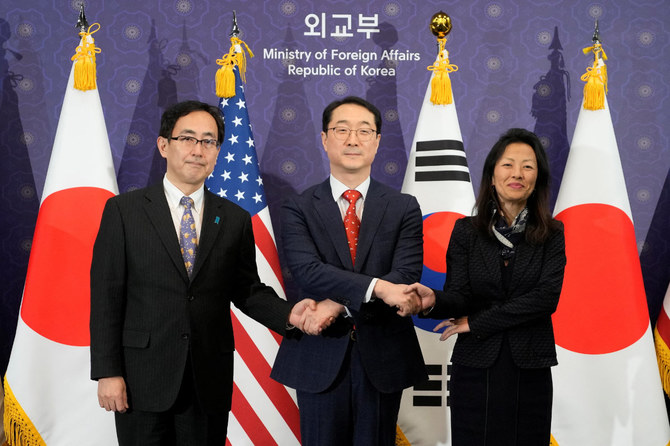
- North Korea’s escalating test-launches in violation of the existing UN sanctions have raised regional tensions to their highest point in years
- China and Russia vetoed a US-sponsored resolution in May 2022 that would have imposed new sanctions over a spate of ICBM launches
Opposition leaders in Kashmir accuse Indian government of sabotaging their campaigns
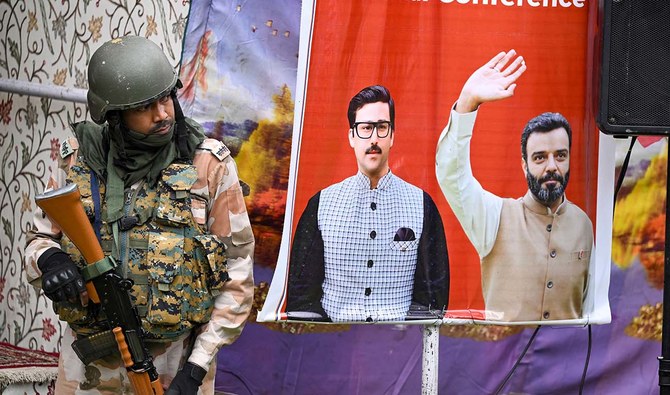
- Omar Abdullah says police canceled permissions for his rallies, asking him to reschedule without giving reasons
- Mehbooba Mufti of People’s Democratic Party also accused the police of not allowing her to hold campaign events
NEW DELHI: Opposition leaders in India’s troubled Kashmir valley have accused Prime Minister Narendra Modi’s administration of denying or canceling permissions to hold campaign events, to help his party’s “proxies.”
Omar Abdullah, a leader of the largest regional political party, the National Conference, said Modi’s government was trying to sabotage his campaign ahead of voting in the first of Kashmir’s three seats on Monday.
Modi’s Bharatiya Janata Party (BJP) is skipping elections in Kashmir for the first since 1996, which analysts and politicians in the region say belies his narrative of integrating Kashmir with the rest of the country and bringing peace and normality to the valley ravaged by a 35-year-old uprising against India’s rule.
In 2019, Modi revoked Jammu and Kashmir state’s partial autonomy, removed its statehood and divided it into two federally-controlled territories: Muslim-majority Kashmir with Hindu-dominated Jammu, and a mountainous Buddhist territory of Ladakh.
While the BJP has not fielded any candidate in Kashmir’s three seats, it has said that, as part of its grand strategy, it would instead support other smaller regional parties, without naming which.
In a letter to the federal poll watchdog, the Election Commission of India, on Thursday, Abdullah said the police, which are under the federal government’s control, canceled permissions for his rallies, asking him to reschedule without providing any reasons.
He said on social media platform X that it was done to help the BJP’s “proxy candidates.”
His rival Mehbooba Mufti, who heads the other regional political powerhouse the People’s Democratic Party (PDP), also accused the police of not allowing her to hold campaign events.
“This attitude of the police, in which they curtail our movement to support the proxy parties of the BJP, is against the guidelines of the Election Commission of India,” she said at a rally in Srinagar on Thursday.
V.K. Birdi, the police official responsible for Kashmir, did not immediately respond to a request seeking comment.
Both Abdullah and Mufti have said they were opposed to the BJP and would support an opposition Congress-led alliance of more than two dozen parties federally.
The state unit of the election watchdog has also asked PDP’s Srinagar candidate, Waheed ur Rehman Para to refrain from calling this election a “referendum” against scrapping of semi-autonomy of the region in 2019 in his speeches.
While Srinagar will vote on May 13, the elections in the other two seats will be held on May 20 and 25.
Nuclear-armed neighbors India and Pakistan control parts of Kashmir, but claim it in full, and have fought two of their three wars over the region.
India top court grants temporary bail to opposition leader Kejriwal to campaign in elections
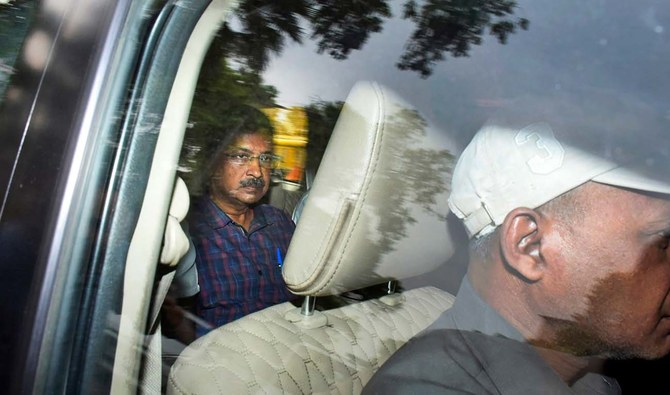
- Bail would last until June 1, last day of seven-phase vote, and Kejriwal would have to surrender on June 2
- Poll marred by charges that PM Narendra Modi’s government is using investigating agencies to hurt rivals
NEW DELHI: India’s top court gave temporary bail to Delhi Chief Minister Arvind Kejriwal in a graft case on Friday, allowing him to campaign in the ongoing general elections, boosting the opposition alliance of which he is a key leader.
The court said the temporary bail would last until June 1, the last day of the seven-phase vote, and Kejriwal would have to surrender on June 2.
The poll has been marred by charges that Prime Minister Narendra Modi’s government is using investigating agencies to hurt rivals, accusations the government denies.
The Enforcement Directorate, India’s financial crime-fighting agency, arrested Kejriwal — a staunch critic of Modi and a key opposition leader — on March 21 in connection with corruption allegations related to the capital territory’s liquor policy.
Kejriwal’s government and his Aam Aadmi Party have denied the corruption allegations. Modi and his Bharatiya Janata Party say that the investigating agencies are only doing their job and the government is not influencing them.
Kejriwal has been in pre-trial detention since April 1, and his wife Sunita has stepped in to campaign for his decade-old party in his absence.
India began voting on April 19 and elections to more than half the total 543 seats were completed with the third phase on May 7. The national capital territory will vote on May 25.
Voting concludes on June 1 and counting is set for June 4.
The Supreme Court, while hearing an appeal against Kejriwal’s arrest last week, said that it “may” consider granting “interim bail” or temporary bail to the high-profile leader “because of the elections” as the appeal against his arrest could take a while to conclude.
Kejriwal argued that he was arrested just before the vote to stop him from campaigning against Modi, who opinion polls suggest will win a comfortable majority and secure a rare third straight term.
His lawyer said Kejriwal is a serving chief minister, not a “habitual offender.”
ED lawyers argued that giving bail to a politician just to campaign will send a wrong message that there are different standards for them and other citizens. Kejriwal had to be arrested as he refused nine ED summons over six months to appear for questioning, they added.
The INDIA alliance of more than two dozen opposition parties has called the action against Kejriwal and other opposition leaders politically motivated to deny them a level playing field in the polls, accusations Modi and BJP reject.
Kejriwal’s arrest had drawn international attention, with Germany and the United States calling for a “fair” and “impartial” trial.
Philippines invites Saudi partnerships in halal industry, renewables
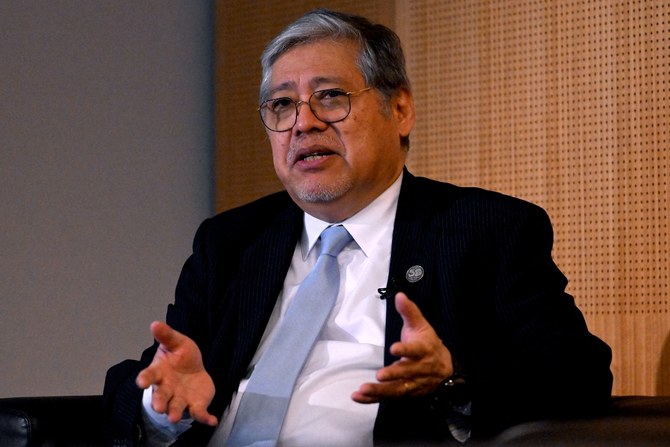
- Govt wants renewables to contribute 35% to energy mix by 2030
- It launched strategic plan to develop domestic halal industry in January
MANILA: The Philippines says it is open to expanding partnerships with Saudi Arabia in its top priority sectors, including renewable energy and the halal industry.
The use of renewable energy was announced as the main issue in the country’s climate agenda during President Ferdinand Marcos Jr.’s first state of the nation address in 2022.
Renewable energy contributes about 30 percent to the Philippines’ energy mix, which is dominated by coal and oil. The government seeks to increase it to 35 percent by 2030 and 50 percent by 2040, and make renewables more accessible to the public.
“Given the Kingdom’s role in the supply of conventional and renewable energy, the Philippines is open to possible partnerships in the field of renewables,” Foreign Affairs Secretary Enrique Manalo told Arab News this week.
An agreement to enhance cooperation in the field was reached in October, during President Ferdinand Marcos’ visit to the Kingdom at the invitation of Saudi Crown Mohammed bin Salman.
A business delegation accompanying the president signed investment agreements collectively worth more than $4.26 billion with Saudi business leaders.
“With Saudi Arabia’s role as a regional business and political hub, we wish to increase investments,” Manalo said.
“Further, amidst the region’s changing landscape and economic diversification initiatives, we aspire to expand our partnership in the fields of agriculture, tourism and the halal industry.”
In January, the predominantly Catholic Philippines — where Muslims constitute about 10 percent of the almost 120 million population — launched its Halal Industry Development Strategic Plan to tap into the global halal market, which is estimated to be worth more than $7 trillion.
The plan aims to double the industry’s output in the next four years, create 120,000 new jobs and attract $4 billion in investments by 2028.
Greece to bring in Egyptian farm workers amid labor shortage
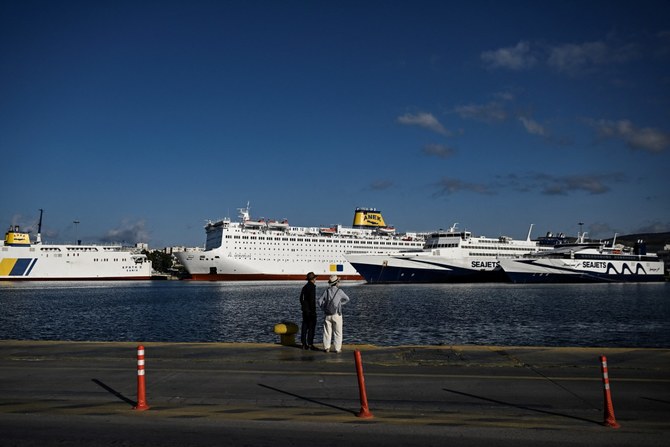
- Greece will take in around 5,000 seasonal farm workers under the 2022 deal signed with Egypt
ATHENS: Greece will start bringing in workers from Egypt this summer to take on temporary farming jobs under a deal between the countries to tackle a labor shortage, the migration ministry said on Friday.
After a decade of pain, the Greek economy is forecast to grow nearly 3 percent this year, far outpacing the euro zone average of 0.8 percent.
But an exodus of workers during Greece’s economic crisis, a shrinking population and strict migration rules have left the country struggling to find tens of thousands of workers to fill vacancies in farming, tourism, construction and other sectors.
Greece will take in around 5,000 seasonal farm workers under the 2022 deal signed with Egypt.
The countries have discussed expanding the “mutually beneficial” scheme to the Greek construction and tourism sectors, the Greek Migration Ministry said in a statement.
Migration has long been a divisive issue in Europe, but the plan had won broad support from employers groups keen to find workers.
Greek Migration Minister Dimitris Kairidis met Egyptian Labour Minister Hassan Shehata in Cairo this week and said the countries should also step up cooperation to fend off illegal migration flows in the region.
Egyptian officials have said their country deserves recognition for largely stopping migrants setting off from its northern coast across the Mediterranean to Europe since 2016.
The European Union this year announced a multi-billion euro funding package and an upgraded relationship with Egypt, part of a push to cut down on the number of migrants crossing over from North Africa.
Rights groups have criticized Western support for Egyptian President Abdel Fattah El-Sisi, who came to power a decade ago after leading the overthrow of Egypt’s first democratically elected leader.
India says Canada has shared no evidence of its involvement in killing of Sikh separatist leader
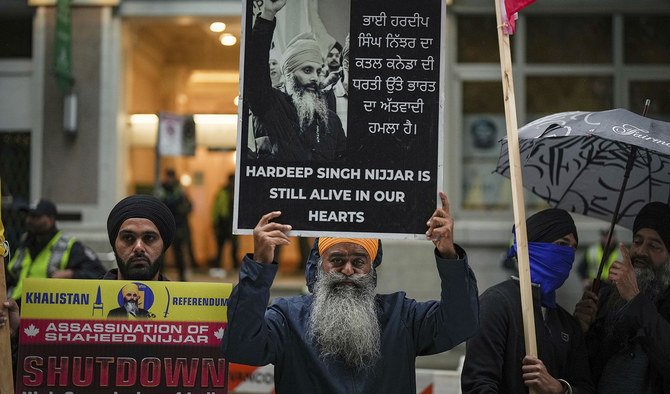
- Three Indian nationals who had been temporarily living in Canada were arrested on Tuesday in the June slaying of Hardeep Singh Nijjar
- PM Trudeau set off a diplomatic spat with India in Sept. when he cited ‘credible allegations’ of India’s involvement in the Sikh’s murder
NEW DELHI: India said Thursday that Canada has shared no evidence to back its allegation that the Indian government was involved in the slaying of a Sikh separatist leader in Canada last year, despite the recent arrests of three Indian men in the crime.
India’s External Affairs Ministry spokesman Randhir Jaiswal also reiterated India’s longstanding allegation that Canada harbors Indian extremists.
Three Indian nationals who had been living in Canada temporarily were arrested on Tuesday in the slaying last June of Hardeep Singh Nijjar in British Columbia. Canadian Prime Minister Justin Trudeau had set off a diplomatic spat with India last September when he cited “credible allegations” of India’s involvement in the slaying of the Sikh separatist. India rejected the accusations.
Canadian Mounted Police Superintendent Mandeep Mooker said after the men’s arrests that the investigation into whether they had ties to India’s government was ongoing.
Jaiswal said the two governments are discussing the case but that Canada has forwarded no specific evidence of the Indian government’s involvement.
Meanwhile, Jaiswal said New Delhi has complained to Canadian authorities that separatists, extremists and those advocating violence against India have been allowed entry and residency in Canada. “Many of our extradition requests are pending,” he said.
“Our diplomats have been threatened with impunity and obstructed in their performance of duties,” Jaiswal added. “We are having discussions at the diplomatic level on all these matters,” he said.
The three Indian men arrested in Canada haven’t yet sought any access to the Indian diplomats there, Jaiswal said.
The three — Kamalpreet Singh, 22, Karan Brar, 22, and Karanpreet Singh, 28 — appeared in court Tuesday via a video link and agreed to a trial in English. They were ordered to appear in British Columbia Provincial Court again on May 21.
They were arrested last week in Edmonton, Alberta. They have been charged with first-degree murder and conspiracy to commit murder.




